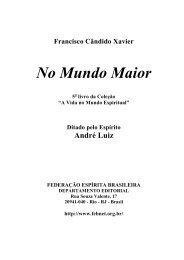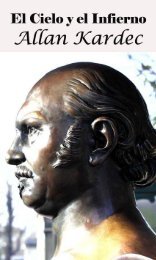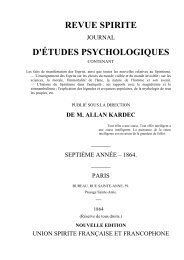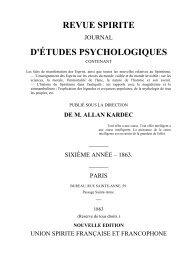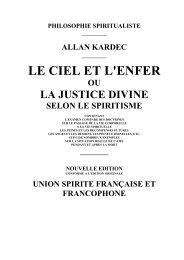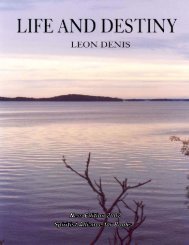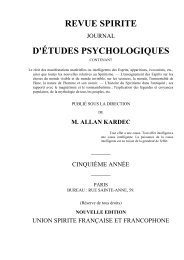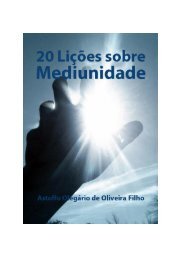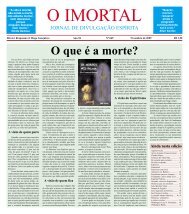PDF version - Geae
PDF version - Geae
PDF version - Geae
Create successful ePaper yourself
Turn your PDF publications into a flip-book with our unique Google optimized e-Paper software.
profound depths of their own reincarnated souls for high conceptions, like men of genius, poets, and<br />
composers.) Often the medium is conscious in the beginning of her trance state. But as soon as the action of<br />
the spirit is accentuated, she finds herself under the influence of a force which acts independently of her will: a<br />
sort of weight oppresses her - her eyes are veiled, and she passes under an invisible dominion. Then the<br />
medium is but an instrument of reception and transmission. As a machine obeys an electric current which<br />
moves it, the medium obeys the current of thought which envelops her.<br />
In the exercise of intuitive mediumship in a waking state, many are discouraged with the difficulty of<br />
distinguishing their own ideas from those which are suggested. It is nevertheless easy, we believe, to recognize<br />
the difference. The spiritually inspired ideas emanate suddenly from an interior source and jet forth<br />
spontaneously, while our own ideas are always at our disposition, and occupy our intellect in a permanent<br />
manner. Not only do the inspired ideas surge up as by enchantment, but they rapidly follow one another, and<br />
are often expressed in an almost feverish manner. Almost all authors, poets, and orators are mediums at certain<br />
moments. They have the intuition of occult assistance in their work. Thomas Paine said: ‘There is no one who,<br />
being occupied with the progress of the human mind, has not observed that there are two distinct classes of<br />
ideas: those produced in ourselves by reflection, and those which are precipitated into our minds. I make a rule<br />
of welcoming the politeness these unexpected visitors, and of determining with all possible care if they are<br />
worthy of attention. I declare that it is to these stranger guests I we all the knowledge I possess.’ Emerson said:<br />
‘Thoughts penetrate themselves into my intellect like a ray of light shining into the darkness. The truth comes<br />
to me, not alone by reason, but by intuition.’<br />
Walter Scott explained to his astonished friends the rapidity with which he wrote the Bard of Avon, as<br />
follows: ‘My fingers worked independently of my thought, and it was the same when I wrote Woodstock. I had<br />
not the least idea that the story would develop into a catastrophe in the third volume! Often when I take my<br />
pen, it moves so fast, I am tempted to let it go alone, to see if it will not write without my assistance.’ Jean<br />
Jacques Rousseau recounts experiences of similar sources of inspiration. The most extraordinary case of<br />
mediumistic inspiration of modern times is that of Andrew Jackson Davies. At the age of fifteen he became<br />
celebrated in American for his ability to diagnose sickness and prescribe remedies. He had at age of fourteen<br />
been magnetized by a Mr. Livingstone of Poughkeepsie, who discovered the boy’s astonishing powers, and<br />
retired from business to associate with him. A poor boy, able only to read, write, and compute in simple<br />
numbers, he announced at the age of eighteen that he was going to be the instrument of a new and astonishing<br />
spiritual power, and he commenced by a series of conferences, which produced considerable effect upon the<br />
scientific and religious world of that day. Eminent men attended his conferences, and his work, Divine<br />
Revelations of Nature, was of so marvelous a nature, emanating from a person of no education or experience,<br />
that it astounded all classes of society. Other voluminous works followed, and this young man, in the course of<br />
years, dictated day by day extraordinary and well-conceived books treating of all the great questions of the<br />
day: among them, ‘Science, and nature in all its ramifications,’ ‘Man in his numberless modes of existence,’<br />
‘God in his depths of love, wisdom and power.’ His MSS. were often submitted to high intelligences, who<br />
declared them most profound, and acknowledged the impossibility of his having written them in his normal<br />
state. The result of the life of this phenomenal person was the revelation that the mind of man could<br />
communicate spiritually with spirits of the higher worlds, and acquired knowledge from those spheres.<br />
* * *<br />
We have incidentally spoken of the method to follow to develop the psychic senses. It consists in<br />
isolating oneself during certain hours of the day or night, suspending the exterior senses, and putting away the<br />
sights and sounds of outside life. This it is possible to do, even in the most humble conditions, and in the heart<br />
of the most common occupations. We must, so to say, turn in upon ourselves, and in the calm and tranquillity<br />
of our thoughts make a mental effort to see and read the great mysterious book within. At these moments,<br />
drive away every thought which is light, trivial, and changing. Material preoccupations create horizontal<br />
currents of vibrations which are obstacles to the etheric radiations, and restrict our perceptions. On the<br />
contrary, meditation and contemplation and the constant effort toward the good and beautiful form ascensional<br />
currents which establish a rapport with the higher planes, and facilitate the penetration in us of divine effluvia.<br />
By this exercise, repeated and prolonged, the inner being becomes little by little illuminated, fertilized, and<br />
104



